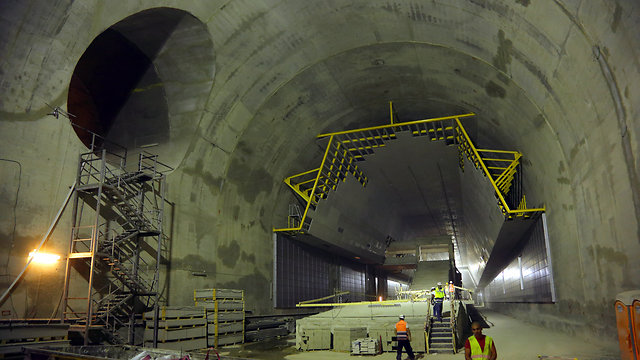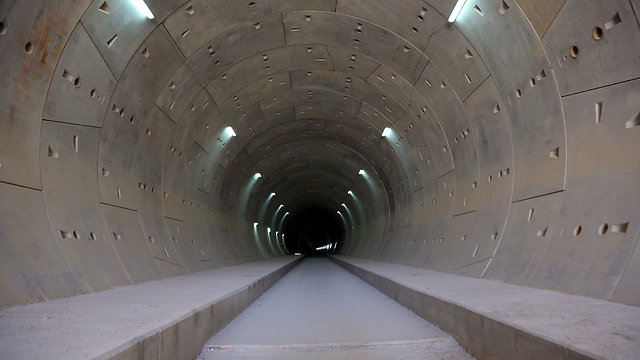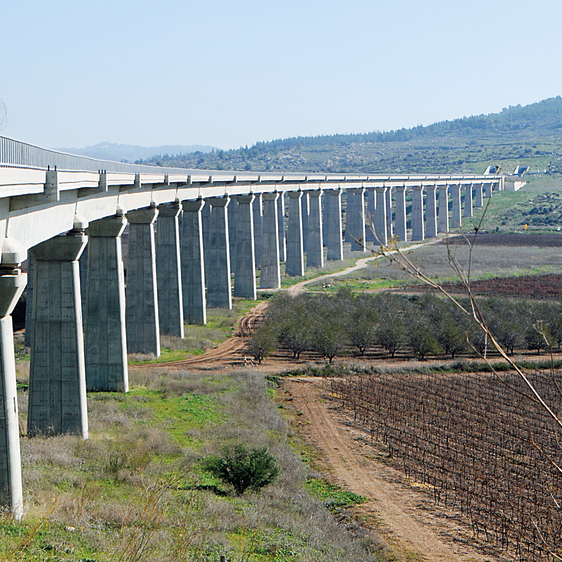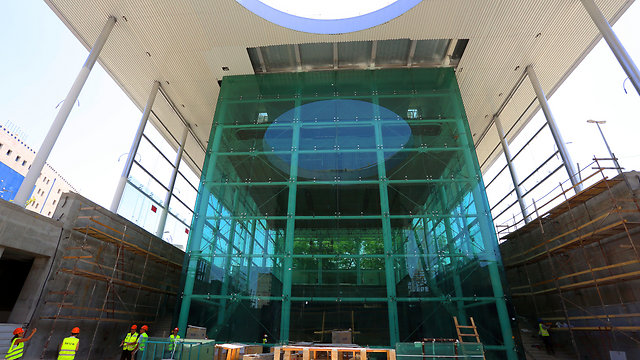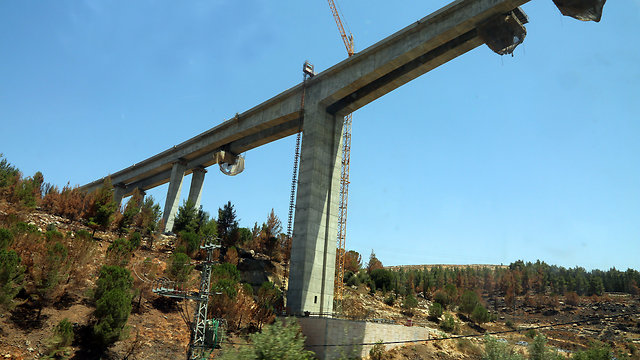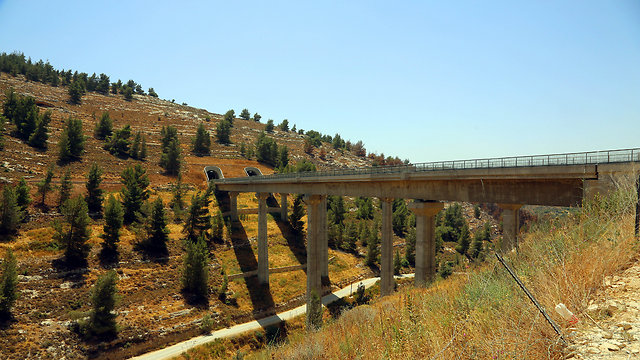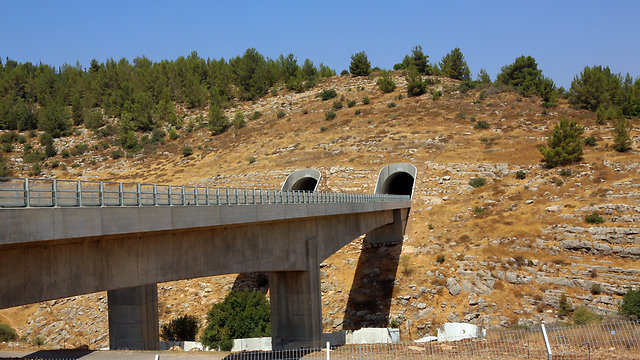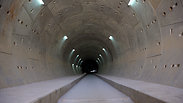
Travelling the tracks to connect Israel's largest two cities
The construction seems endless, but only a year and a half allegedly remain until the 28-minute high-speed train between Tel Aviv and Jerusalem is to open; Ofer Petersburg traveled the section of it leading to the capital, containing Israel's longest bridge, its highest, a nature reserve, and the Mideast's largest tunnel.
For years, we've heard talk of the fast train between Tel Aviv and Jerusalem. Innumerable data, schedules, company names, problems, disagreements—but as of late, this grandiose project has been transforming into something real. You can already sense its impending grandeur: passing on bridges over beautiful abysses, travelling several minutes in a dim tunnel, and emerging from the earth to discover Jerusalem before you.
This is all without mentioning the impressive engineering and technological operations, from quarrying machines digging deep tunnels into mountains that look like giant caterpillars nibbling on rock to the construction of a massive subterranean nuclear fallout shelter at the Jerusalem station, the International Convention Center (ICC, also known as Binyenei Ha'uma).
Tunnels 1 and 2: Above and beneath Sha'ar Hagai
If everything runs according to schedule, a year and a half from now, a train at 160 km an hour will depart four times an hour and carry us between the capital and the nonstop city in just two minutes shy of a half hour. This large and impressive project includes 57 km of tracks, and its cost is estimated as some 7 billion shekels. It includes five tunnels and ten bridges, about 700 engineers, and hundreds of other professionals working three shifts around the clock.
According to Boaz Tzafrir, the CEO of Israel Railways, the majority of the work has been completed, and all that remains now are some completing measures: laying tracks, signaling systems, etc. Minister of Transport Yisrael Katz intends to inaugurate the project at the beginning of 2018 along with the upgraded highway to Jerusalem, currently being constructed in full swing.
We were taken on a tour of the section between the Sha'ar Hagai section and Jerusalem, the construction of which is currently being completed. Thirty-one kilometers that include some of the most beautiful views of our country, the longest tunnel in the Mideast, the longest bridge in Israel, and the highest bridge in Israel. Even the most cynical will be impressed.
The first tunnel on the route from Tel Aviv to the capital is about 3.6 km long and passes from Latrun to Sha'ar Hagai. In actuality, it's two adjacent tunnels, with a separate one for each direction of travel.
They were dug, for the first time in the country, by a Tunnel Boring Machine (TBM): a huge rotating cylinder that digs a circular path while installing concrete sides. The TBM is about 150 m long with a 10-meter diameter, and it weighs 1,500 tons. It digs 22 meters a day.
This first tunnel is connected to Tunnel 2 by a bridge of a mere 35 meters. Tunnel 2 continues from Sha'ar Hagai to the Yitla River Valley, a distance of 1.2 km.
Bridge 6: Israel's longest
There's not much to elaborate about the view—the picture pretty much says it all. What you don't see is that it's Israel's longest bridge—1,250 meters—passing over the Ayalon River to Latrun. The bridge, which somewhat resembles a Roman aqueduct, is in fact a double bridge: That is, there are two sets of parallel tracks running in opposite directions. The tracks have already been laid on a section.
ICC Station: Emergency fallout shelter
Upon reaching the terminus in Jerusalem, between the ICC and the Central Bus Station, one suddenly has the impression of being abroad. The train stations sprawls over 72,000 square meters, and the platforms are at a depth of 80 m, which makes it one of the five deepest train stations in the world.
The escalators leading up are already present, and there are three elevators, each with a capacity of 33 persons. Four 320-meter platforms have already been constructed.
The security system is designed according to the most stringent international standards for crowds of 4,000 simultaneous passengers. The station is also intended to be used in case of emergency as a civilian nuclear shelter for 2,000 persons. Its steel doors have already been installed. Alongside the station, a 1,200-space subterranean parking facility will be built.
Bridge 10: Israel's highest
Another peak for the country: The highest bridge in Israel—95 meters—passes above Emek Ha'arazim. It was an engineering challenge, and its accomplishment is impressive, as is the view: Overlooking the valley, on the bridge one can already see Jerusalem in the distance. Today, you can cross it on foot, which is what we did, but from the end of the year, tracks will already be laid on it.
From the tracks, the route enters Tunnel 4, which is 2.6 km long. It begins under Highway 1 west of the Sakharov Gardens, and it splits at the end to two tunnels leading to the Jerusalem terminus's two halls.
Bridge 8: Nature-friendly
This beautiful site, where the tracks pass over the Yitla River, is the reason for the many delays in the route's construction. It's a nature reserve that conservation groups lobbied to protect as much as possible. To do so, the bridge was constructed using a balanced-foundry method, which allows it to stand on one sole post. This has already won it international awards.
Passengers, too, will be rewarded, but with the wonderful scenery. The bridge is 160 m long and its height is 28 m. It, too, is double. A helipad will be built nearby for emergencies.
Tunnel 3: 12 km into the earth
The most impressive feat of engineering completed in Israel: 11.6 continuous kilometers of tunnel (which, again, is composed of two adjacent tunnels) at a depth of 300 meters: the longest and deepest tunnel in the Middle East. We drove through it in a car in about fifteen minutes. The train will traverse it in four.
The travelers from Tel Aviv will enter it by the Yitla River and exit it by the Halilim River, east of Mevaseret Zion. The adjacent tunnels were dug by two TBMs.
Recently, after one of the service passes between the adjacent tunnels collapsed, a Dutch team of experts examined the 46 service passes and found that 33 of them had a risk of water leakage and cracks. Israel Railways has already repaired 23 of them at a cost of about 12 million shekels. The subject of responsibility for damages is currently being legally clarified between the state and the Shapir company.










